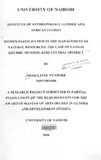| dc.description.abstract | This study set out to examine the gender perspectives of land use and management
in Keumbu Division of Kisii District, Kenya. It specifically investigated into the
interplay between male-female relations and land ownership, decisions on land use,
stratification of domestic responsibilities, and the gender equality promotion policy
frameworks as they bear on the functioning of land use and management in the area.
The data required for this study was both quantitative and qualitative in nature, and
was obtained through administration of semi-structured questionnaires to 45 people,
in-depth interviews and focus group discussions. The respondents to the
questionnaire were residents of Keumbu area and were selected by simple random
sampling method, participants in the focus group discussions were members of this
community with homogeneous characteristics and the in-depth interviews were
done with the administrative and agricultural government officials in the study area.
The quantitative data was cleaned and analyzed with the aid of computer SPSS for
windows and qualitative data obtained from in-de-pt.h interviews and focus group discussions analyzed thematically in line with the procedures laid down under the
grounded theory. The analysis has established that the participation of men and
women in land use and management in Keumbu is largely tied to patriarchal
ideologies as they impinge on the socio-economic and cultural life forms of this
community, with women appearing to be distinctively disadvantaged in terms of
land ownership and influence on decisions about land use, financial capacity and
performance of domestic chores relative to men. The study has also established that
awareness about and enforcement of the existing wide range of international and
national policy frameworks on gender equality in the management of productive
resources like land is extremely ·low in Keumbu. In view of these findings, it is
concluded that acquiring gender equality in land use and management in Keumbu is
a matter largely at primary stages.
To reverse this condition, suggestions for action are made to the research
community, policy makers and to the people of Keumbu themselves. The research
community is herein invited to accord this subject greater attention and rigour with
a view to inform the direction of the inherent policies and actions. The policy
makers are called upon to be more vigorous in enforcement of the existing
international and national gender equality promotion commitments or formulate
new ones that can better address the current appalling depth of gender disparity in
use and management of land. For the people of Keumbu, it is recommended that
they take a much more proactive approach to the search for gender equality in the use and management of land in their midst by lobbying and advocating for
appropriate policy legislation and implementation as well as inculcating attitudes,
values and practices that are favourable to both women and men | en |

